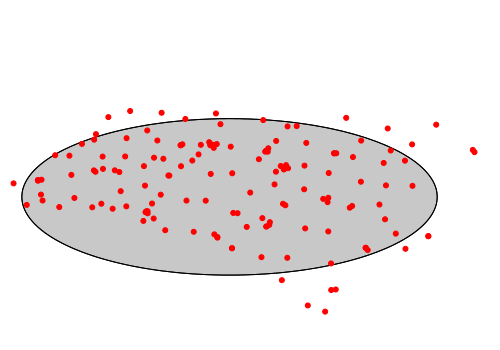Note: This document is for an older version of GRASS GIS that has been discontinued. You should upgrade, and read the current manual page.

NAME
v.ellipse - Computes the best-fitting ellipse for given vector data.KEYWORDS
vector, geometry, best-fitting ellipseSYNOPSIS
v.ellipse
v.ellipse --helpv.ellipse input=name output=name [step=float] [--overwrite] [--help] [--verbose] [--quiet] [--ui]
Flags:
- --overwrite
- Allow output files to overwrite existing files
- --help
- Print usage summary
- --verbose
- Verbose module output
- --quiet
- Quiet module output
- --ui
- Force launching GUI dialog
Parameters:
- input=name [required]
- Name of input vector map
- Or data source for direct OGR access
- output=name [required]
- Name for output vector map
- step=float
- Step size in degrees
- Default: 4
Table of contents
DESCRIPTION
v.ellipse computes the best-fitting ellipse for input vector map and creates new output vector map with ellipse. Input vector data might be 2D points, lines, or areas.
Fig: Fitting ellipse created with v.ellipse
EXAMPLE
Example of v.ellipse created around set of points (using data points_of_interest, North Carolina sample data set). Ellipse is is approximated by linestring with point distance 1 degree (step).v.ellipse input=points_of_interest output=ellipse step=1
REFERENCES
SEE ALSO
v.hullAUTHOR
Tereza Fiedlerova, OSGeoREL, Czech Technical University in Prague, Czech RepublicSOURCE CODE
Available at: v.ellipse source code (history)
Latest change: Monday Jun 28 07:54:09 2021 in commit: 1cfc0af029a35a5d6c7dae5ca7204d0eb85dbc55
Main index | Vector index | Topics index | Keywords index | Graphical index | Full index
© 2003-2023 GRASS Development Team, GRASS GIS 7.8.9dev Reference Manual